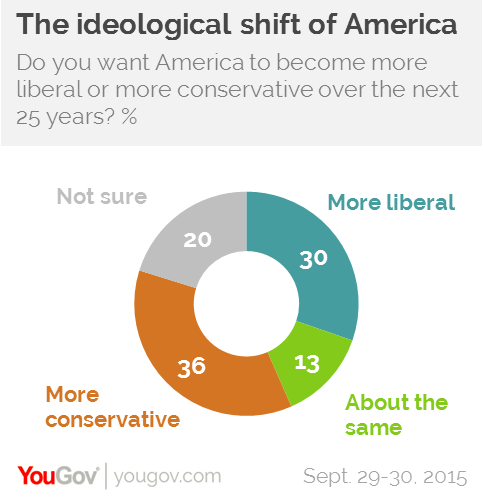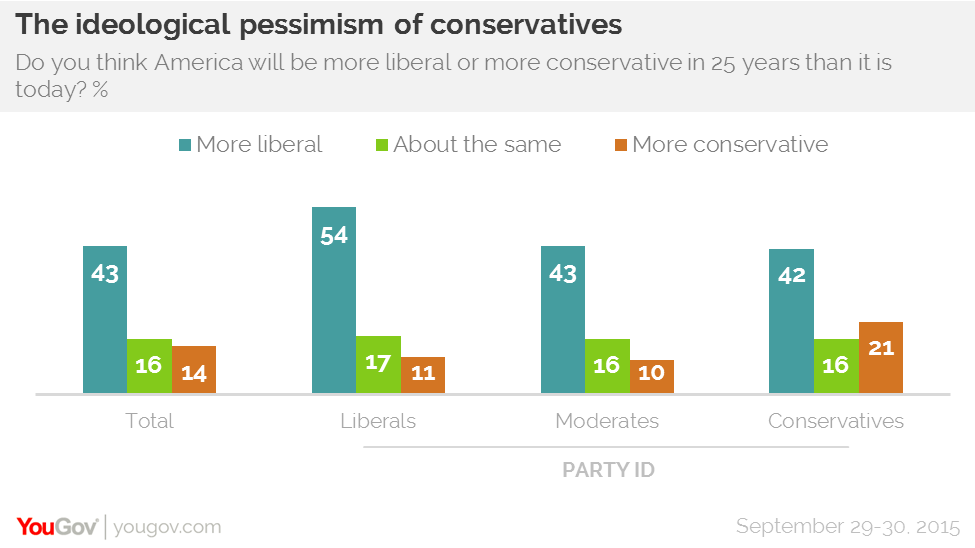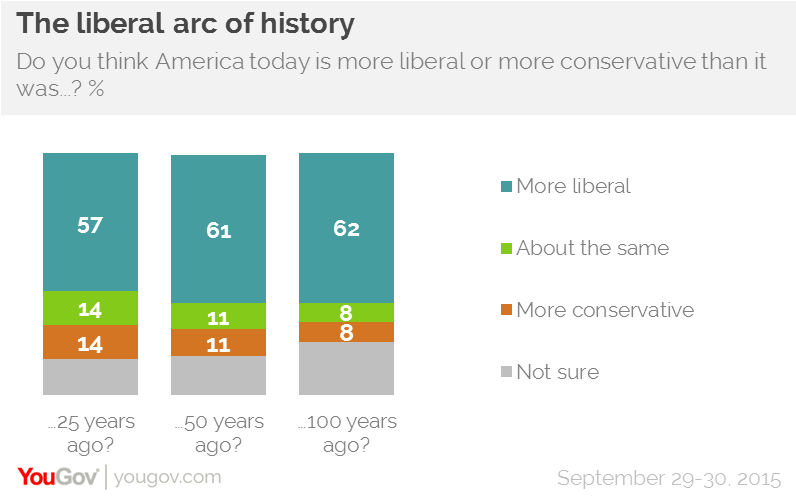Even conservatives expect America to become more liberal
Americans are divided on whether they want the country to become more conservative or more liberal, but even conservatives widely expect the country to

So far 2015 has undoubtedly been a good year for liberals. The Supreme Court has legalized same-sex marriage throughout the country and Obamacare is now almost totally implemented, while legal threats to the system have been struck down. Looking back just ten years to the apex of conservative power after George W. Bush's re-election, however, illustrates how quickly fortunes can change.
YouGov's latest research shows that few Americans (13%) want America to remain as it is today while two-thirds want the country to change. 36% of the country want America to become more conservative while 30% want the country to become more liberal. Unsurprisingly a large majority of Republicans (70%) want America to become more conservative, while just under half of Democrats (47%) want the country to become more liberal.
Despite the differences on the desired trajectory for America, people tend to expect that the country will become more liberal (43%). Even among conservatives 42% of them expect the country to be more liberal than it is today in 25 years time, while only 21% think that America will be more conservative by 2040.


Must be why congress has shifted to the right in recent years.
ReplyDeleteThis would seem to be applicable.
ReplyDeleteJune 12, 2014
Political Polarization in the American Public
How Increasing Ideological Uniformity and Partisan Antipathy Affect Politics, Compromise and Everyday Life
Republicans and Democrats are more divided along ideological lines – and partisan antipathy is deeper and more extensive – than at any point in the last two decades. These trends manifest themselves in myriad ways, both in politics and in everyday life. And a new survey of 10,000 adults nationwide finds that these divisions are greatest among those who are the most engaged and active in the political process.
Democrats and Republicans More Ideologically Divided than in the Past
http://www.people-press.org/2014/06/12/political-polarization-in-the-american-public/
Almost every year between 1996 and 2012, except 1997, the Pew Research Center asked random samples of the American public: "[d]o you think of yourself as conservative, moderate, or liberal?" In 1996, 40% of the public identified themselves as conservatives, 40% said they were moderates, and 20% claimed to be liberals. In 2012, the percentages of the three categories were 39, 37, and 23. With one or two exceptions in the 1990s, most years saw shifts of one or two percentage points.
ReplyDeleteThese data enable the Pew Research Center's conclusion that, "[d]espite electoral swings in recent elections, the fundamental ideological breakdown of the American public has shifted little in recent years."
To reiterate, if ideology can be captured by a single query, Pew's data underscore the assertion that Americans' ideological identifications have changed very little over the last three decades. Moreover, whether one looks at Gallup or Pew Research Center polls, self-identification as conservative has outweighed liberal identification by as much as 2-to-1 or as little as 3.5-to-2.
Claims that the "Obama Era" represents a profound shift to the left at the American grassroots ring hollow.
"Claims that the "Obama Era" represents a profound shift to the left at the American grassroots ring hollow."
DeleteMost of the claims by those firmly committed to left or right ring hollow to me. What has undeniably occurred over time, is that in each successive generation of Americans, there has been a loosening of opinion about what was previously taboo. I wouldn't call that a shift to the left, but I would call it a change in thinking and it happens every decade.